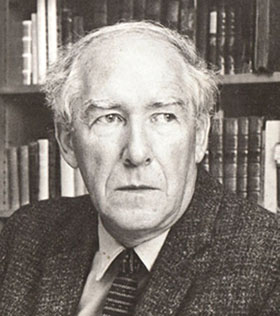A. D. Hope facts for kids
Quick facts for kids
A. D. Hope
|
|
|---|---|

Hope, c. 1969
|
|
| Born | 21 July 1907 |
| Died | 13 July 2000 (aged 92) |
| Alma mater | |
| Occupation | Poet and essayist |
| Spouse(s) |
Penelope Robinson
(m. 1937; died 1988) |
Alec Derwent Hope (born July 21, 1907 – died July 13, 2000) was a famous Australian poet and essayist. He was known for his clever and sometimes funny writing that often made fun of things. This style is called satire. Hope was also a respected critic, a teacher, and a university professor. One American journal even called him "the 20th century's greatest 18th-century poet."
Contents
Life of A. D. Hope
Hope was born in Cooma, New South Wales, Australia. His father was a minister and his mother was a teacher. He learned a lot at home and also in Tasmania, where his family moved in 1911. Three years later, they moved to Sydney.
Hope went to Fort Street High School and then the University of Sydney. He also studied at the University of Oxford in England on a scholarship. When he came back to Australia in 1931, he trained to be a teacher. He worked as a psychologist and later taught at Sydney Teachers' College from 1937 to 1944.
From 1945 to 1950, he was a lecturer at the University of Melbourne. In 1951, he became the first professor of English at the new Canberra University College. This college later joined with the Australian National University (ANU). At ANU, Hope helped create the first full-year course in Australian literature at an Australian university. He retired from ANU in 1968.
Hope received many awards for his work. He was made an Officer of the Order of the British Empire in 1972. In 1981, he became a Companion of the Order of Australia. He passed away in Canberra in 2000 and is buried in the Queanbeyan Lawn Cemetery.
A. D. Hope: Poet and Critic
Even though he started writing poetry when he was young, his first main collection was The Wandering Islands (1955). Most of his earlier writings were lost in a fire. Hope was inspired by famous poets like Alexander Pope, W. H. Auden, and William Butler Yeats. He was a very knowledgeable person who learned a lot on his own.
Hope was also known for his reviews of other writers' works. In the 1940s and 50s, his reviews were known for being very sharp and intelligent. They helped improve the quality of literary discussions in Australia. However, as he got older, Hope became more gentle. Poet Kevin Hart said that Hope was "invariably gracious and benevolent" when he knew him.
Hope once wrote in a letter that he felt he had reached a great achievement when someone compared him to one of Yeats's "wild, wicked old men." He joked that he was probably wicked but not very wild. A writer named Catherine Cole suggested that Hope had three important qualities: he was a storyteller, a teacher, and an enchanter.
Influence of A. D. Hope
When A. D. Hope died in 2000, many people believed Australia had lost its greatest living poet. Kevin Hart, a poet, said that Hope was once asked what poets could do for Australia. Hope replied, "oh not much, merely justify its existence." This shows how important he felt poetry was.
In 1998, a book celebrating his life and work was published. It was called The Scythe Honed Fine and was put out by the National Library of Australia.
Private Life
In 1937, Alec Hope married Penelope Robinson. They had three children: a daughter named Emily, and two sons, Andrew and Geoffrey. Penelope passed away in 1988.
Awards and Honors
Hope received many important awards for his poetry and writing:
- 1956: Grace Leven Prize for Poetry
- 1965: Britannica Australia Awards for Literature
- 1966: Australian Literature Society Gold Medal
- 1967: Myer Award for Australian Poetry
- 1969: Ingram Merrill Foundation Award for Literature (New York)
- 1969: Levinson Prize for Poetry (Chicago)
- 1972: Officer of the Order of the British Empire (OBE)
- 1976: The Age Book of the Year Award for A Late Picking
- 1976: Robert Frost Award for Poetry
- 1981: Companion of the Order of Australia (AC)
- 1989: New South Wales Premier's Literary Awards Special Award
- 1993: ACT Book of the Year for Chance Encounters
- He also received honorary doctorates from four Australian universities.
See also
 In Spanish: Alec Derwent Hope para niños
In Spanish: Alec Derwent Hope para niños

